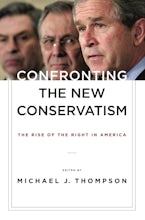Confronting the New Conservatism
The Rise of the Right in America
William Kristol, Paul Wolfowitz, Donald Rumsfeld, Condoleeza Rice, George F. Will, and Dick Cheney. These are today’s neoconservatives“confident, clear-cut, and a political force to be reckoned with. But how should we define this new conservatism? What is new about it? In this volume, some of today's top political scholars take on the charge of explaining, defining, and confronting the new conservatism of the last twenty-five years. The authors examine the ideas, policies and roots of this ideological movement showing that contemporary neoconservatism has been able to blend many of the aspects of social conservatism—such as religious populism and nationalism—with economic liberalism and the rhetoric of equality of opportunity and individualism. With their emphasis on dismantling the welfare state and a rhetorical return to economic laissez faire and individual rights, neoconservatives have been able to harness populist sentiment in terms of both economics and cultural issues. And with their belief in moral and cultural “simplicity,” their turn away from science, their conviction in American superiority on the global stage, and their embrace of “anti-government” rhetoric, they have effectively changed the nature of the American political landscape.
The contributors to Confronting the New Conservatism offer a trenchant analysis and substantive critique of the neoconservative ethos, arguing that it is an ideology that needs to be better understood if change is to be had.
Contributors: Stanley Aronowitz, Chip Berlet, Stephen Eric Bronner, Lawrence Davidson, Greg Grandin, Philip Green, Diana M. Judd, Thomas M. Keck, Charles Noble, R. Claire Snyder, Michael J. Thompson, and Nicholas Xenos.
Contributor Bios
Reviews
"Thompson . . . has put together a book of essays that seeks to & confront this new conservatism and lay bare its inner workings. The collection brings together commentators on contemporary American politics. . . . The group has an unabashedly progressive bent and their stated objective is to bury the new conservatism even as they enviously praise its successes." ~ Popmatters
"A useful resource that will enable the careful reader to understand the similarities and differences among these multiple ideologies." ~ Choice
"Arguing that American conservatism today is not only a rejoinder to liberalism but a reflection of at least some of its values, Confronting the New Conservatism subjects the neo-conservative and Christian conservative movements to thoughtful scrutiny and original scholarly analysis. While animated by progressive politics, this collection offers students and citizens alike a deeper look at the intellectual and ideological foundations of the American right in ways that will encourage understanding as well as a more effective liberal response." ~ Benjamin R. Barber,author of Jihad vs. McWorld
"Thompson has assembled an exciting collection of essays written by a high quality group of scholars. The essays are sharp and academically rigorous, but also highly engaging and readable." ~ Judith Grant,author of Fundamental Feminism
 This work is licensed under a
Creative Commons Attribution-NonCommercial-ShareAlike 4.0 International License
(CC BY-NC-SA).
This work is licensed under a
Creative Commons Attribution-NonCommercial-ShareAlike 4.0 International License
(CC BY-NC-SA).


